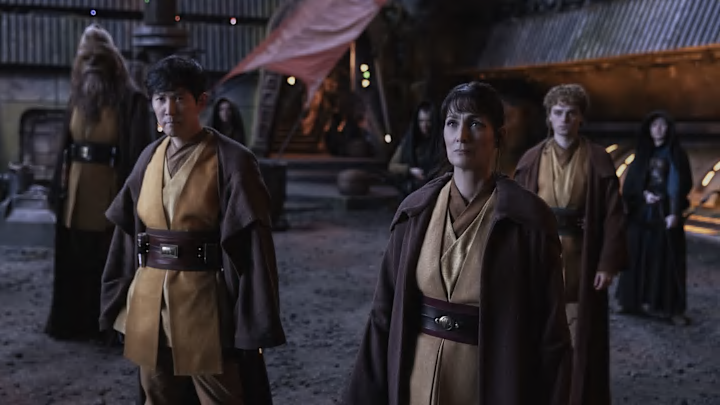The third episode of Star Wars: The Acolyte takes a quick detour from the main storyline of the show, taking us back in time 16 years to when Mae and Osha (played here by Leah Brady and Lauren Brady) were children. We get to see their lives back when they were living among a coven of Force-sensitive witches. They are about to undergo an initiation ceremony when four Jedi — Sol (Lee Jung-jae), Indara (Carrie-Anne Moss), Torbin (Dean Charles-Chapman) and Kelnacca (Joonas Suotamo) — arrive and say they want to take the twins to Coruscant for training.
This episode doesn't seem to know what it really wants to do and has more than its fair share of contradictions. For a start, the Jedi have arrived to take the twins, but as was shown in The Phantom Menace, the Jedi don't interfere with planets that aren't under their jurisdiction, and Qui-Gon Jinn had to buy Anakin out of slavery before he could take him to the temple. It's also shown in The Clone Wars that the Jedi allow the Nightsisters of Dathomir to continue practicing their magic even though they present a threat. It's actually Grievous and his droid army that wipes them out.
Fans are talking about the way the episode handles Force. It seems that through some method, the witches have managed to create Mae and Osha using the Force; they have no father. The witches see the Force as a thread, rather than an omnipresent power than can be manipulated by anyone who has the right skills.
The only other time we've seen a virgin birth happen in Star Wars before is with Anakin Skywalker, who was supposed to be the Chosen One predicted by a prophesy, so why were Osha and Mae created? Does this mean they are equally special in some way? The problem is that this is set just a century or so before the prequels, so there isn't much room for galaxy-defining events to happen here without influencing everything that follows. On the other hand, if they are not important, then why were they created in the first place? It seems that being able to create life from nothing is a powerful and potent thing, so it shouldn't be used lightly.
If you want to change how the Force works, okay, but there has to be a good, strong reason for doing it, with excellent writing to back it up, and both these things are missing here. It's similar to the changes made in the Ahsoka show, when Sabine suddenly became Force sensitive out of nowhere. The problem is that the more you mess with the Force, the less it makes sense. Even when George Lucas was still involved, Star Wars was always coy about how it really worked, with things like the Mortis arc on The Clone Wars being wisely left open-ended, rather than delivering any explicit answers.
Outside of this, the episode wasn't that good on its own merits, and was lackluster in its execution. It also fell into one of the big traps that so many shows seem to do now, devoting an entire episode to a flashback rather than weaving it in throughout the series. This has the effect of killing the momentum built up by the first two episodes, especially as this was a particularly slow-paced entry that delivered a bunch of information in an exposition dump, rather than spreading the info throughout the series. It would have been much better to keep jumping back to Mae and Osha's childhood throughout the show, revealing bits of it here and there, which is not only more entertaining, but can also be used to keep building intrigue.
The Acolyte was already off to a shaky start with its first two episodes, and now they've taken a big detour right out of the gate. The show doesn't seem prepared to get into complicated questions of how the Force works, or who should be allowed to use it and for what purpose.
There seem to be more questions than answers left by the end of this episode. How did the witches die? It was apparently in the fire, but we didn't see them burnt, and if Mae started it, then why was Torbin so filled with guilt that he was willing to kill himself over it all those years later? Why would the Jedi attack without provocation just to rescue one child who they had no jurisdiction to take back to Coruscant anyway?
With any luck, there will be answers coming that will make this episode look better in hindsight, but so far it only serves to take the attention away from the real storyline and doesn't show us anything that hasn't already been mentioned before in the series. Hopefully Episode 4 will get back to the Jedi solving mysteries.
To stay up to date on everything fantasy, science fiction, and WiC, follow our all-encompassing Facebook page and Twitter account, sign up for our exclusive newsletter and check out our YouTube channel.
